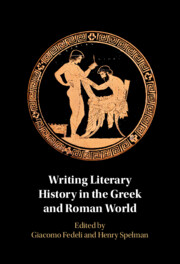Book contents
- Writing Literary History in the Greek and Roman World
- Writing Literary History in the Greek and Roman World
- Copyright page
- Contents
- Contributors
- Introduction
- Part I Between Literature and Scholarship
- Part II Lives and Afterlives
- Part III Narratives of Change
- Epilogue
- Chapter 14 The Losers’ Legacy
- Afterword
- Bibliography
- Index Locorum
- Index of Subjects
Chapter 14 - The Losers’ Legacy
Placing Literary Fragments in Literary History
from Epilogue
Published online by Cambridge University Press: 07 June 2024
- Writing Literary History in the Greek and Roman World
- Writing Literary History in the Greek and Roman World
- Copyright page
- Contents
- Contributors
- Introduction
- Part I Between Literature and Scholarship
- Part II Lives and Afterlives
- Part III Narratives of Change
- Epilogue
- Chapter 14 The Losers’ Legacy
- Afterword
- Bibliography
- Index Locorum
- Index of Subjects
Summary
Relatively few works of ancient literature survive intact. Many more are known only as fragments or through the testimony of other authors. How should literary history acknowledge the fact and the consequences of such extensive loss? This chapter reviews the difficulties in identifying and presenting the evidence for lost works, explores what (besides their hypothetical reconstruction) can be learned from their remains, and considers how accommodation of the lost and the fragmentary challenges historians of literature to rethink the objectives and the methods of their enterprise.
- Type
- Chapter
- Information
- Writing Literary History in the Greek and Roman World , pp. 305 - 324Publisher: Cambridge University PressPrint publication year: 2024

